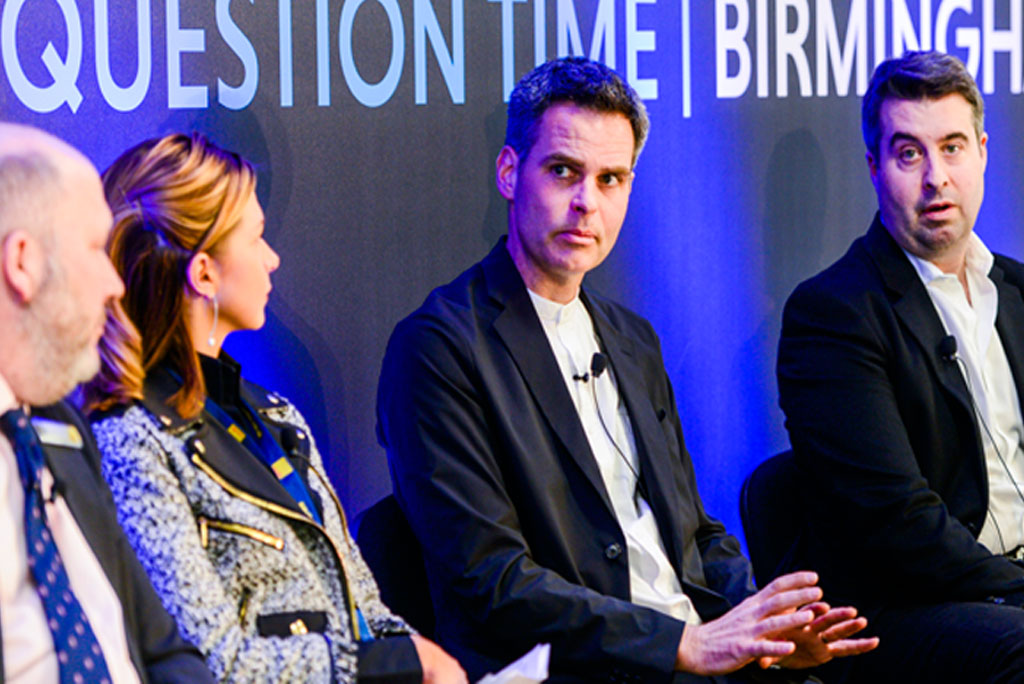
Victoria Turnbull of Opus Land discusses the benefit of the HS2 at EG’s Birmingham Question Time
Infrastructure and how to benefit from Brexit were two big themes at EG’s first Question Time event of the year, held at Legal & General’s One Colmore Square in Birmingham.
Turnbull and other panellists at the event said that new cross country and suburban connections around Birmingham needed to be prioritised alongside the arrival of HS2.
While the high speed connection between London and Birmingham, which opens in 2026, will halve journey times between the two cities to just 40 minutes, many in Birmingham think that cross country services are more important than reinforcing existing links with London.
The WMCA is starting to look at cross connections from the city, with extensions of the existing tram and two new suburban rail links connecting to the station. However, there is still speculation about the possible re-opening of existing stations on existing lines – such as Mosely. This would help reinforce the city’s existing transport infrastructure, but be considerably cheaper than new lines.
Brexit opportunities
The panellists also saw the UK’s exit from the European Union an opportunity for Birmingham to grow and attract further support from central government.
Despite the shake up seen in London, regional property growth has been more robust since the referendum result and the view was that the city should focus on this, and seize the opportunity to redirect investment from government to the city.
Birmingham will intervene in Black Country building
The West Midlands Combined Authority will directly intervene in the Black Country to remediate land and provide oven ready sites for housing developers, according to its chief executive Deborah Cadman.
Talking to an overwhelmingly positive room at EG’s Birmingham Question Time, Cadman said that to attract investment: “We have to intervene to make sure it’s a level playing field.
She said the authority was aiming to become an expert in the delivery of brownfield land and would create a brownfield institute that would be “globally acclaimed”.
The WMCA has committed to building 250,000 homes by 2030 and is looking for new opportunities for land assembly. There are huge swathes of land in the former mining and industrial areas of the Black Country that could be used for housing, but the pollution of the makes viability difficult.
And the WMCA has huge pots of funding to make it happen: an £8bn pot over the next 20 years, £250m from the last devo-deal, and it was currently negotiating for a further £500m from the housing growth fund.
Cadman said the WMCA wants developers to come and talk to it, and is reliant on their help.
However, she cautioned that she did not want development for the sake of development.
Griffiths said key events over the rest of the year will be the handover of the Commonwealth Games baton, and possible early announcements about HS2.
Author: Alex Peace
Link to article: https://bit.ly/2GaWxfj
“It’s such a missed opportunity if we do not as a region capitalise on the connections into and out of HS2,” said Victoria Turnbull, joint managing director of Opus Land. “It’s disappointing the HS2 station is 15 minutes away from New Street. It is something that really needs to be thought through, something that we have to be critically aware of.”
“That is something the West Midlands needs to improve on,” said Pete Gladwell, head of public sector investments at L&G Real Assets. “I would put cross country rail ahead of HS2, and the other one that’s really important is intra-regional. You have to think about how to bring the wider regions into that success story.”
“That is something the West Midlands needs to improve on,” said Pete Gladwell, head of public sector investments at L&G Real Assets. “I would put cross country rail ahead of HS2, and the other one that’s really important is intra-regional. You have to think about how to bring the wider regions into that success story.”
“There is an exciting opportunity that comes from the referendum,” said L&G’s Gladwell. “Brexit can help the regions – there is recognition coming in Whitehall that if they keep everything focused on London, leadership in the regions will puts its hand up and say we feel disenfranchised, and that divergence will continue.”
“It brings its own opportunity to forge our own relationships and bring in new money,” said Turnbull.
“The interesting thing as I see it,” added Griffiths, “is that normally the slightest ripple in the pond from the South East causes this tidal wave of concern and negative sentiment that washes over the regional markets. This time the tsunami of Brexit is not putting people off making decisions.”
“In the Black Country we need to acquire and remediate land to bring it to market, to achieve regeneration in the region.”
“The important message in that mission is that it’s not just about building buildings – the physical regeneration – it’s about regenerating the community as well. You cannot have a strong vibrant economy without a strong vibrant community.
“If we are attracting investment it has to be the right investment to work with us and our communities.”
“Is it possible to be too positive about anything?” he says. “I cannot believe we are sitting here in Birmingham criticising ourselves for being overly positive.”
“Everybody is keen and anxious to see further progress in terms of HS2, and hopefully some early announcement in terms of early commitment on the station and, critically, that we get the right sort of quality stations, both at UK central and at Curzon in the city centre.”



















